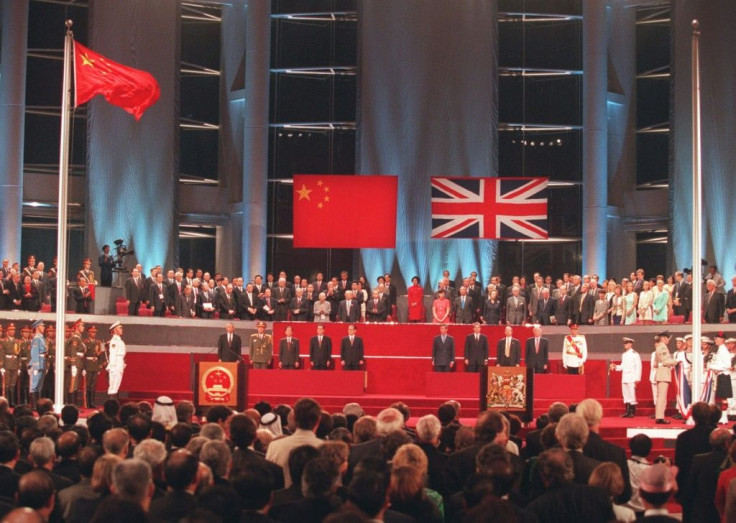Tears, Guilt And Hope For Hong Kongers Seeking New Life In Britain
As the clock counts down to her finally leaving Hong Kong, Judy is riddled with self-doubt and guilt over the gut-wrenching decision to move her family to the other side of the world for a new life in Britain.
Over the past few years, the 36-year-old mum of two has looked on as authorities dismissed successive waves of pro-democracy protests and then went after those who took part in them.
When Britain introduced visas offering a pathway to citizenship to any Hong Konger born before the city's 1997 handover to China, Judy and her husband decided to take the plunge.
The former public affairs officer quit her job and the family is preparing to depart in April.

But saying goodbye -- to friends, to family, to Hong Kong's food and language -- is far from easy.
"My grandfather is in his nineties and I am leaving him behind in the last mile of his life," she told AFP.
"I feel very guilty and unhappy but I also do not want to stay any more because I feel unsafe here."
Judy was one of a dozen Hong Kongers AFP has spoken to in recent weeks either planning to relocate to Britain or already there.

Some were happy to talk openly while others, like Judy, requested their identity be masked.

Britain's new scheme is a response to Beijing's decision last year to impose a sweeping national security law on the former colony.
It is not clear how many Hong Kongers will take up the offer -- especially while the coronavirus pandemic strangles so much normal activity around the world and restricts international flights.
But applications for British National (Overseas) passports -- the document Hong Kongers born before 1997 can apply for -- have soared 300 percent since the security law came in.
Britain predicts up to 154,000 Hong Kongers could arrive over the next year and as many as 322,000 over five years, bringing an estimated "net benefit" of up to ?2.9 billion ($4 billion).

Hong Kong officials have played down the departures, saying few will ultimately leave and that those who do can be replaced by arrivals from the Chinese mainland.
Prominent pro-Beijing politician Regina Ip dismissed those going to Britain as people with "no money, skills or education".
But much like the hundreds of thousands of Hong Kongers who left ahead of the 1997 handover -- many of whom subsequently returned -- the average profile of those departing who AFP spoke to tended to be the opposite.
Most were educated, middle-class families, often with young children and -- most importantly -- enough money in the bank to make the move and survive the prospect of many months looking for work in Britain.

Many owned property with a good portion of the mortgage already paid off -- a valuable nest egg considering the average price for a 500-square-foot (46-square-metre) apartment is around HK$7million ($900,000).
Ellie, a 30-year-old psychologist, said she and her IT-professional husband were looking to leave in the next two years but already have a plan in place to "expedite" their move if it looks like China might stop people going to Britain.
"I have my son's future at stake as education in the city is changing," she told AFP.
The lure of an open education system in Britain was frequently cited as a primary reason to leave.
After huge and often violent youth-led democracy protests rocked Hong Kong in 2019, Chinese authorities have vowed to stamp out dissent in schools and on campuses.
Last week, the Education Bureau issued new guidelines for schools warning there was "no room for debate or compromise" over national security, adding that acts like singing songs, chanting slogans and forming human chains could warrant police action.
Textbooks are being rewritten with an emphasis on patriotism.
Winston Wong and Connie Chan, both 40, are among some 7,000 Hong Kongers who left for Britain last year and are settling into a new life in the Essex town of Chelmsford.
Their primary motivation, said Wong, was finding a school for their 9-year-old son that will "encourage students to ask questions, think independently and stand up for fairness and equality".
"If you want to have a nice life where you can freely speak of everything without being worried or fearful, then you have to pay the price for coming over," said Wong, who left behind a well-paid job in finance and has yet to find work in Britain.
Many of those who do move to Britain know they may struggle to find similarly paid work.
"It won't be on the same level as in Hong Kong and I have to start from square one," said Mike, a 39-year-old medical scientist and father of two, who recently relocated his family to Manchester and is looking for work.
Back in Hong Kong, he said, his family used to take regular holidays to Japan and Thailand. His current salary is around 30-40 percent of what he used to earn.
But he says he has no regrets.
"I also told my friends to leave if they can," he said.
"Hong Kong is no longer the place we loved."
© Copyright AFP 2024. All rights reserved.





















